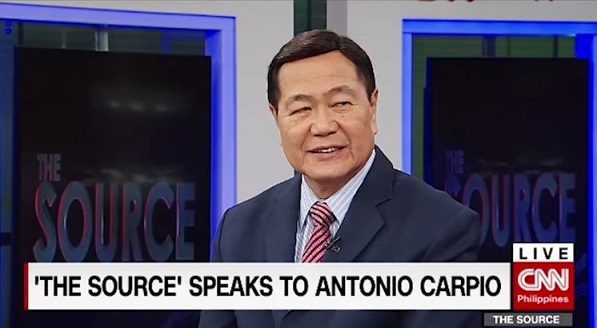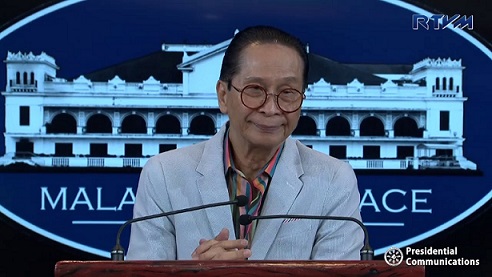This is becoming ludicrous.
Presidential Spokesperson Salvador Panelo’s explanation of the President’s declaration of his helplessness about the situation in the West Philippine Sea because China is “in possession” of disputed geographical features in the area has made the mess messier.
Carpio is now suggesting that the President disown the statement of his spokesman and chief presidential counsel.

This all started when the President said in his State-of-the-Nation address last Monday that “You know, I cannot go there even to bring the Coast Guard to drive them away. China also claims the property and he is in possession. ‘Yan ang problema. Sila ‘yung in possession and claiming all the resources there as an owner. We are claiming the same, but we are not in the position because of that fiasco noong dalawang nag-standoff doon during the time of my predecessor si Albert, ambassador.”
National Security Adviser Hermogenes Esperon and Defense Secretary Delfin Lorenzana tried to downplay the adverse implication of that statement by reducing it to a pronunciation error- that what everybody heard President say, “possession” should have been in “position.”
That was weird.
But it seems the worst was to yet to come.
In his post-SONA briefing, Panelo clarified that what the President meant was “legal possession.”
He said: “But when you’re ba in possession, isang portion lang ang ipu-possess mo? Kapag mayroon kang mga military installation doon, in other words, pinapakita na kaya nilang bantayan iyong buong lugar nila, eh di in possession pa rin sila. Hindi naman kailangan physically. Like when you have 10,000 hectares, do you need to be all over the 10,000 hectares to call it your own? There’s such thing as legal possession – iyon. As far as they’re concerned sa kanila iyon. And they are in possession kasi they can enforce it eh, iyon ang punto.”
Carpio, in an interview with CNN’s Pinky Webb in the morning show “The Source” explained the “serious” implication of Panelo’s statements. He said the basis of China’s claim in the South China Sea is the nine-dash line which was invalidated by the Arbitral Court in the case filed by the Philippines against China. Even if they are in possession of the geographical features, it’s “illegal possession.”
Carpio warned: “The moment you say that China is in legal possession, you abandon the ruling, you contradict the ruling and you give China an ammunition to demolish our ruling. China will always cite this statement by the Chief Presidential Legal Counsel that the Philippines has submitted that we are in legal possession and therefore that ruling will not apply anymore because this is a subsequent statement of the Philippines.”
Being the President’s spokesman, Carpio said Panelo’s “legal possession” statement has the effect of being “the thinking of the President.”
To cure the harm that Panelo’s statement has caused, Carpio suggested that the President disown his presidential counsel’s statement. Or Foreign Secretary Teddy Locsin should disown Panelo’s statement.
Or, Carpio said, Panelo should take back his statement. If he doesn’t want to take it back, he should say that he was just joking.
Panelo is not taking back his statement nor is he saying he was joking. He is now using another term: “constructive possession.”

In yesterday’s press briefing, he was asked about Carpio’s advice. He took a jibe at the senior justice saying he was not listening to his analogy. He said: “No. What I meant was in constructive possession. I was making an analogy doon sa ten—hindi ba sabi ko, when have 10 hectares, you don’t have to be in the entire 10 hectares. You can still occupy one place and you have legal possession. Analogy lang iyon, what I meant was constructive possession.
“The way Secretary Esperon and Secretary Delfin explained that they are in positional advantage, which means they are in constructive possession by reason of the installation of military—what do you call that, camps… airport… installation… whatever. In other words, they can do something to protect what they claim to be their territory.”
China must be enjoying this.
Be First to Comment